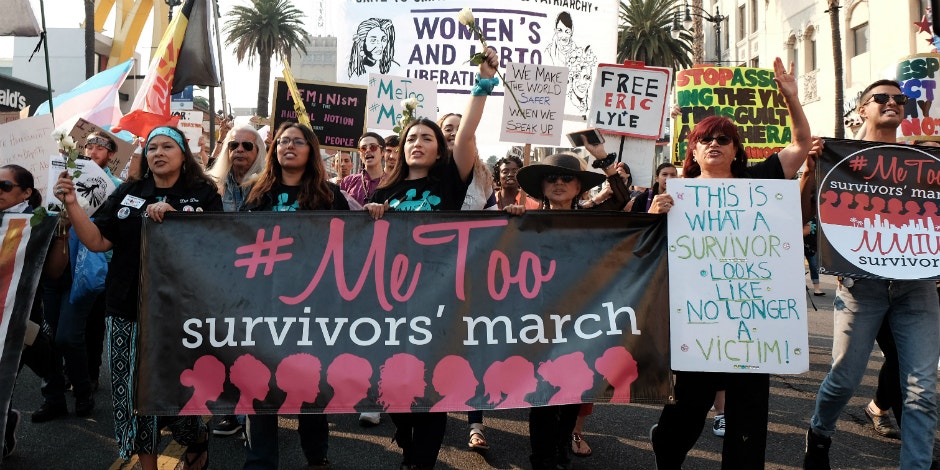Founder Of #MeToo Rape Kit Speaks Out After Being Accused Of Trying To Profit Off Sexual Assault
People aren't sure it's a good idea.
 Getty
Getty After a woman has survived a sexual assault, the damage is still being done. Not only do we have to live with the emotional and often physical aftermath of such an assault, but should we decide to report the attack itself we are expected to go to a hospital and let strangers touch and examine our bodies if we want to have even a small chance of getting the justice we so rightly deserve. Who is Madison Campbell? She's a woman who set out to change all that by creating rape kits that a person can do themselves at home after an attack. But she's already receiving criticism and the reasons for it make more sense than you might think.
1. The MeToo Kits
A company based right out of my very own home city of Brooklyn, New York is trying its best to change the way rape survivors are tested after they're assaulted. Their motto says it is all, this is a company that wants women to be able to take back their bodies and their own lives: "Your experience. Your kit. Your story. Your life. Your choice." The kit is being made by a company named The MeToo Kit and what they are planning on offering survivors is revolutionary. They promise you a kit that you can do entirely yourself, enabling you to compile the physical evidence that remains after an assault at your own home rather than forcing you to go to a hospital and endure interactions there.
2. But Are They Admissable?
In theory, the kits are a great idea but not everybody feels that way. In fact, people are already sharing their skepticism about them. For Michigan Attorney General Dana Nessel, her issues with the kits were put forth in a cease and desist letter that was sent to the company. It said, in part, that “an at-home evidence kit does not address the health care needs of many sexual assault survivors." Nessel pointed out that the margin for error was high and that the kits might not be admissible in court. People like Morgan Dewey, the communications director at End Rape on Campus is an advocate for anything that helps survivors provided those options aren't harmful. Because this kit doesn't provide any emotional support after the attack, Dewey believes the kit falls into the harmful category.
3. Madison Campbell Speaks Out
But the MeToo Kit's founder and creator, Madison Campbell, isn't backing down. She believes that she's found a way to help women in need and she has no plans on halting the production of the kits. When she learned of Nessel's remarks criticizing the kits, she struck back saying that she “should be more concerned with creating a productive dialogue in which my colleagues and I can address some of the concerns she may have.” Campbell, a survivor of sexual assault that took place on campus, was also eager to let her critics know that they planned on working with experts to make sure that the kits could in fact be used in a courtroom. It's clear that this is a project that matters to her, and she's right to want to speak to her critics directly.
4. Advocating For Survivor's Rights
"After my sexual assault, I did not even want to touch myself — let alone let anyone touch my body or console me. We believe that it should be a survivor’s right to capture this evidence within the comfort of their own home," said Madison when discussing what prompted her decision to create this product. There is data to support the idea that there are hurdles that prevent assault survivors from reaching out for medical assistance. These barriers are believed to include the fact that women believe they will be treated badly simply because they are women, or because they are concerned that they will be reported to other government agencies, like immigration. These are undeniable problems that a kit just can't fix.
5. So What Is A Rape Kit?
According to RAINN, a rape kit includes what's necessary for a full sexual assault forensic exam to take place. The exam itself is made up of a few different parts. First, a nurse or a trained examiner collects whatever DNA evidence is present on the survivor's body. Then, they perform a full physical exam on the survivor. This exam itself can be treated as evidence should the survivor decide that they wish to file criminal charges. In addition to these steps, the person conducting the exam tests the survivor for STIs and provides STI treatment as well as pregnancy prevention options like the morning after pill should that be something they are interested in. Most DNA evidence has to be collected within 72 hours.
6. The Final Word
While the actual effectiveness of the kit itself in prosecuting rape and assault charges seems to be up for debate, effectiveness isn't the only reason that Madison believes that the kit could be effective. “If every freshman during orientation was given a kit, we believe that it would not only enable survivors the privacy and comfort of collecting evidence at home but also create a psychological deterrent on campus. Perhaps the predatory nature of parties on college campuses would change if everyone knew that everyone had a kit," she said. If her way of thinking is correct, assailants simply knowing that the kit is available is enough to lower the number of attacks on campus. Me? I don't know if it's that simple.
Rebecca Jane Stokes is a writer living in Brooklyn, New York with her cats, Batman and Margot. She's an experienced generalist with a passion for lifestyle, geek news, pop culture, and true crime.
